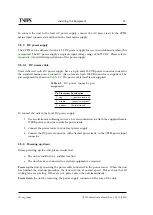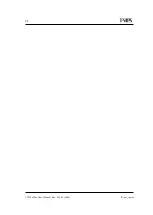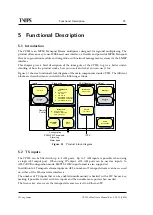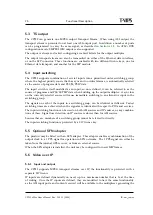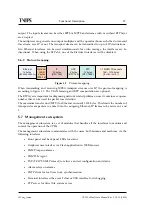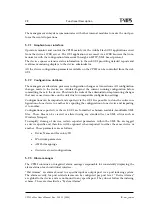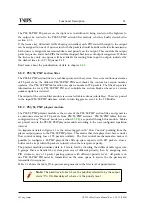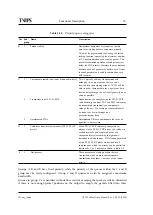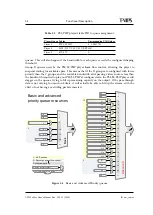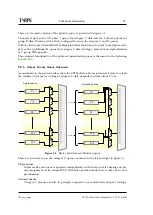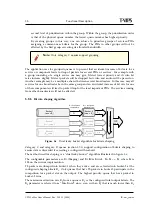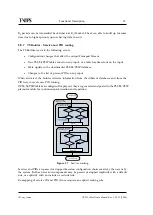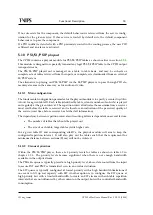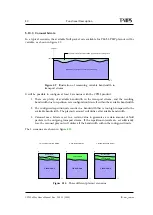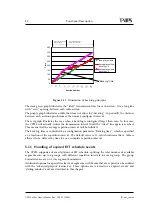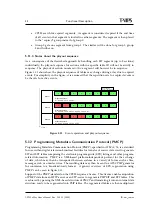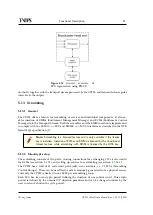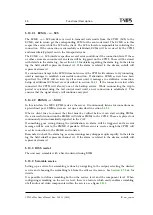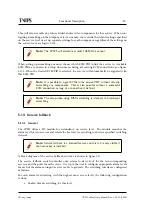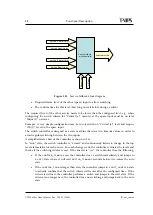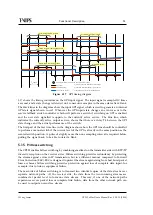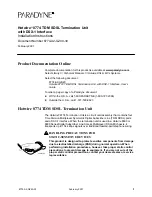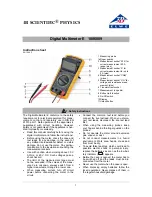
36
Functional Description
CP525 cMux User’s Manual Rev. 5.20.12 (3944)
ID: um_tsmux
second level of prioritisation within the group. Within the group, the prioritisation order
is that of the physical queue number, the lowest queue number has highest priority.
By creating groups in this way, one can achieve to prioritise groups of services/PIDs
assigning a common max bitrate for the group. The PIDs in other groups will not be
affected by the first group exceeding its allocated bandwidth.
Note:
Only category C queues support grouping.
The application case for grouped queues is to prevent that accidental increase of bit rate for a
service or component leads to drop of packets for several PIDs or services. For example with
a group consisting of a single service one may give Teletext lowest priority and if video bit
rates increase slightly Teletext packets will be dropped but video and audio will be passed on.
Another example may be a multiplex shared between several broadcasters. In this case may all
services for one broadcaster be in the same group and an accidental increase of bit rate for one
of these components will lead to packet drop for the least important PIDs. The services coming
from other broadcaster will not be affected.
5.9.6 Bitrate shaping algorithm
R
2
Bucket-2
(size = B
2
)
R
1
Total
Output
Rate
R
t
Bucket-1
(size = B
1
)
R
2(N-1)
Bucket-2
B
2(N-1)
=size 2
R
1(n-1)
Bucket-1
B
1(n-1)
=size 1
R
2N
Bucket-2
B
2N
=size 2
R
1N
Bucket-1
B
1N
=size 1
A
rb
it
ra
ti
o
n
L
o
o
p
R
1
= Configured
shaping rate
B
2
= configured
Max Burst size
Figure 5.6
Dual leaky bucket algorithm for bitrate shaping
Category C and category D queues (section
) support configuration of bitrate shaping to
assure data is discarded if exceeding a configured threshold.
The method used for shaping is a “dual leaky bucket” algorithm illustrated in figure
.
The configurable parameters are R
1
(Shaping) and B
2
(Max Burst). B
1
+B
2
<
= B
t
, where B
t
is
128 on the current implemention.
TS packets are dumped into bucket-1 when they arrive, and are extracted into bucket-2 at the
configured shaping bitrate R
1
. Only queues that have TS packets in bucket-2 participate in the
competition for a packet slot on the output. The highest priority queue that has a packet in
bucket-2 wins.
The maximum extraction rate R
2
from a queue is R
t
, i.e the configured total output bitrate. The
B
2
parameter is referred to as “Max Burst” since, even with an R
1
that is much lower than R
t
,
Summary of Contents for CP525 cMux
Page 2: ......
Page 10: ......
Page 12: ...12 CP525 cMux User s Manual Rev 5 20 12 3944 ID um_tsmux ...
Page 18: ...18 CP525 cMux User s Manual Rev 5 20 12 3944 ID um_tsmux ...
Page 24: ...24 CP525 cMux User s Manual Rev 5 20 12 3944 ID um_tsmux ...
Page 66: ...66 CP525 cMux User s Manual Rev 5 20 12 3944 ID um_tsmux ...
Page 238: ...238 CP525 cMux User s Manual Rev 5 20 12 3944 ID um_tsmux ...
Page 248: ...248 CP525 cMux User s Manual Rev 5 20 12 3944 ID um_tsmux ...
Page 276: ...276 CP525 cMux User s Manual Rev 5 20 12 3944 ID um_tsmux ...


